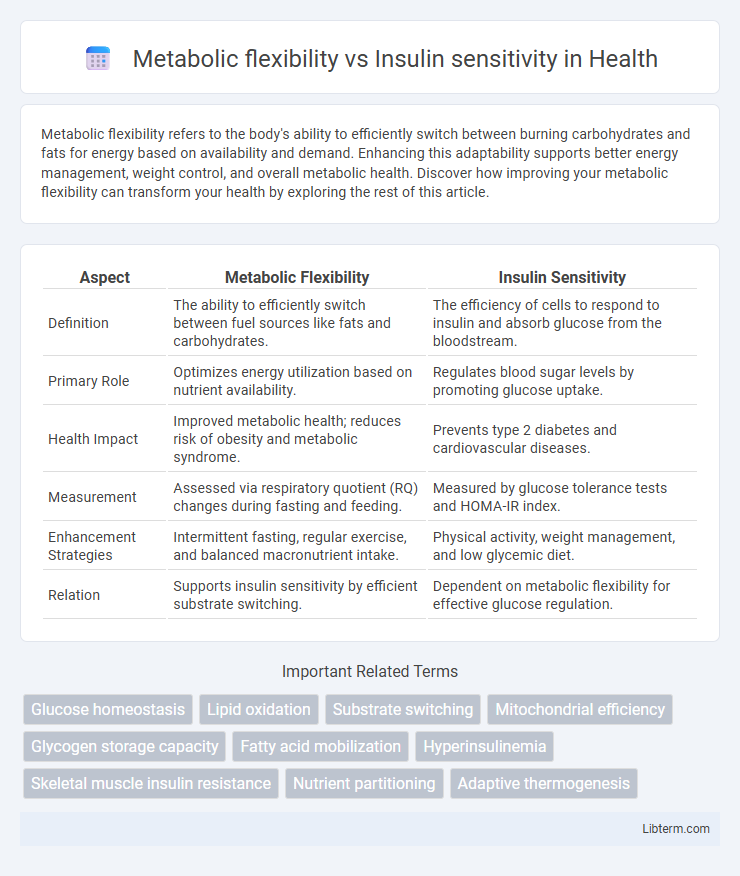Metabolic flexibility refers to the body's ability to efficiently switch between burning carbohydrates and fats for energy based on availability and demand. Enhancing this adaptability supports better energy management, weight control, and overall metabolic health. Discover how improving your metabolic flexibility can transform your health by exploring the rest of this article.
Table of Comparison
| Aspect | Metabolic Flexibility | Insulin Sensitivity |
|---|---|---|
| Definition | The ability to efficiently switch between fuel sources like fats and carbohydrates. | The efficiency of cells to respond to insulin and absorb glucose from the bloodstream. |
| Primary Role | Optimizes energy utilization based on nutrient availability. | Regulates blood sugar levels by promoting glucose uptake. |
| Health Impact | Improved metabolic health; reduces risk of obesity and metabolic syndrome. | Prevents type 2 diabetes and cardiovascular diseases. |
| Measurement | Assessed via respiratory quotient (RQ) changes during fasting and feeding. | Measured by glucose tolerance tests and HOMA-IR index. |
| Enhancement Strategies | Intermittent fasting, regular exercise, and balanced macronutrient intake. | Physical activity, weight management, and low glycemic diet. |
| Relation | Supports insulin sensitivity by efficient substrate switching. | Dependent on metabolic flexibility for effective glucose regulation. |
Understanding Metabolic Flexibility
Metabolic flexibility refers to the body's ability to efficiently switch between fuel sources, primarily fats and carbohydrates, depending on availability and energy demands, which is crucial for maintaining energy balance and metabolic health. Insulin sensitivity plays a key role by regulating glucose uptake and utilization, influencing how effectively cells respond to insulin and metabolize carbohydrates. Impaired metabolic flexibility is often linked to insulin resistance, contributing to metabolic disorders such as type 2 diabetes and obesity.
Defining Insulin Sensitivity
Insulin sensitivity refers to how effectively the body's cells respond to the hormone insulin, facilitating glucose uptake from the bloodstream into tissues for energy production or storage. High insulin sensitivity allows for efficient blood glucose regulation, reducing the risk of metabolic disorders like type 2 diabetes. Metabolic flexibility, closely linked to insulin sensitivity, is the body's ability to switch between burning carbohydrates and fats depending on availability and energy demands.
Key Differences Between Metabolic Flexibility and Insulin Sensitivity
Metabolic flexibility refers to the body's ability to switch efficiently between burning carbohydrates and fats for energy based on availability and demand, whereas insulin sensitivity measures how effectively cells respond to insulin to uptake glucose. Key differences include metabolic flexibility's focus on substrate utilization adaptability, while insulin sensitivity directly impacts glucose regulation and blood sugar control. Both factors influence metabolic health but target distinct physiological mechanisms crucial for energy balance and diabetes prevention.
Mechanisms Behind Metabolic Flexibility
Metabolic flexibility refers to the body's ability to efficiently switch between using carbohydrates and fats as energy sources depending on availability and demand, which is heavily influenced by mitochondrial function and enzyme activity. Mechanisms behind metabolic flexibility involve enhanced fatty acid oxidation, improved glucose uptake through GLUT4 translocation, and regulated expression of key metabolic genes such as PGC-1a and AMPK. Insulin sensitivity directly impacts metabolic flexibility by modulating insulin receptor signaling pathways, ensuring effective glucose utilization and maintaining energy homeostasis.
Factors Influencing Insulin Sensitivity
Insulin sensitivity is primarily influenced by factors such as physical activity, diet composition, body fat distribution, and genetic predisposition, which collectively impact how efficiently cells respond to insulin. High levels of visceral fat and sedentary lifestyle reduce insulin sensitivity, increasing the risk of insulin resistance and type 2 diabetes. Conversely, regular exercise, balanced macronutrient intake, and maintaining a healthy weight enhance both insulin sensitivity and metabolic flexibility.
Relationship Between Metabolic Flexibility and Insulin Sensitivity
Metabolic flexibility, the body's ability to switch between fuel sources like fats and carbohydrates, directly impacts insulin sensitivity by enhancing glucose uptake and utilization in tissues. Improved metabolic flexibility reduces insulin resistance, facilitating more efficient blood sugar regulation and lowering the risk of type 2 diabetes. Research shows a strong correlation where individuals with high insulin sensitivity exhibit greater metabolic flexibility, promoting overall metabolic health.
Impact on Health and Disease
Metabolic flexibility, the body's ability to switch between fuel sources like glucose and fat, directly influences insulin sensitivity by optimizing energy utilization and reducing metabolic stress. Enhanced insulin sensitivity improves glucose uptake and lowers blood sugar levels, decreasing the risk of type 2 diabetes, cardiovascular disease, and obesity-related complications. Impairments in either metabolic flexibility or insulin sensitivity contribute to metabolic disorders, inflammation, and increased susceptibility to chronic diseases.
Lifestyle Factors Affecting Both Metabolic Flexibility and Insulin Sensitivity
Physical activity enhances metabolic flexibility by improving mitochondrial function and promotes insulin sensitivity through increased glucose uptake in muscles. A balanced diet rich in fiber, healthy fats, and low in refined sugars supports both metabolic flexibility and insulin sensitivity by stabilizing blood glucose levels and reducing inflammation. Adequate sleep and stress management regulate hormonal balance, further optimizing metabolic responses and insulin action.
Assessing and Measuring Metabolic Flexibility vs Insulin Sensitivity
Assessing metabolic flexibility involves measuring the body's ability to switch between fuel sources, typically evaluated through indirect calorimetry by analyzing respiratory exchange ratios during fasting and postprandial states. Insulin sensitivity is commonly measured using techniques like the hyperinsulinemic-euglycemic clamp, considered the gold standard, or surrogate markers such as HOMA-IR calculated from fasting glucose and insulin levels. Combining metabolic flexibility assessments with insulin sensitivity tests provides comprehensive insights into metabolic health and risk factors for metabolic disorders.
Strategies to Improve Both Markers for Optimal Health
Improving metabolic flexibility and insulin sensitivity involves adopting strategies like regular physical activity, especially high-intensity interval training (HIIT), which enhances mitochondrial function and glucose uptake. Incorporating a balanced diet rich in fiber, omega-3 fatty acids, and low glycemic index carbohydrates supports better insulin response and metabolic adaptability. Time-restricted feeding or intermittent fasting can also optimize fuel utilization and improve both insulin sensitivity and metabolic flexibility through improved cellular signaling and reduced inflammation.
Metabolic flexibility Infographic

 libterm.com
libterm.com